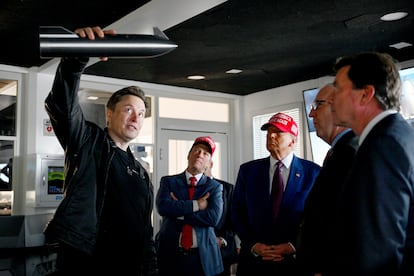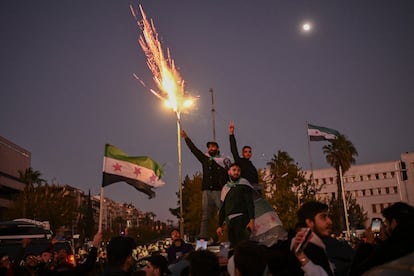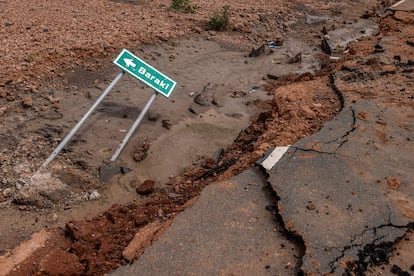Wars, climate disasters and techno-billionaires: 2025 ushers in a new world order
Donald Trump’s return to the White House threatens to revolutionize international relations, which were already shaken by Russia’s invasion of Ukraine. Everything points to profound changes in conflicts, alliances, trade, the fight against climate change and the future of democracy

The year 2025 is shaping up to be a powerful accelerator of the path to a new world order. Multilateralism is breaking down, old alliances are deteriorating, new ones are being consolidated, protectionism is rampant and democracy faces unprecedented threats.
China has long been seeking a reformulation a reformulation of the pacts between nations that better aligns with its interests. Russia shattered the post-Cold War balances in 2022, when Vladimir Putin catapulted the globe into a new geopolitical era with the large-scale invasion of Ukraine — a violent challenge to the previous world order. And, starting on January 20 — the day of Donald Trump’s inauguration as president of the United States — the global population will have to accept that the great power that built the current world order now wants a different one.
The confluence of these factors means that 2025 has the potential for extraordinary change. As a recent report by the International Crisis Group notes, “the world seems primed for a paradigm shift. The question is whether it will happen at the negotiating table or on the battlefield.”
Of course, whenever it suited it, the U.S. has broken the principles and trampled on the institutions of the order it built and is now dismantling. But, even if it was created for selfish interests, this was the driving force behind the construction of a framework with international agreements and institutions that had some beneficial effects.
Trump, however, doesn’t seem to believe in this, either out of principle or self-interest. He demonstrated this in his first term, and everything indicates that his second term will be much more disruptive. This is, firstly, because he was much less prepared when he assumed office in 2017, both in terms of crafting a roadmap and putting together the team required to execute it. Also, the global context has changed: Putin has openly challenged the West, there’s a terrifying conflict in the Middle East, techno-emperor Elon Musk has a major new role in shaping events, while other problematic factors have emerged.
Perhaps not even Trump knows exactly what he’ll do when it comes to the wide range of key issues. Much less how reality will unfold, taking into account the wills and capabilities of other actors (who shouldn’t be underestimated). But it’s still possible to make some projections. This report seeks to shed light on the challenges that lie ahead with the help of six geopolitical experts, who shared their viewpoints with EL PAÍS.
From multilateralism to bilateralism
The end of the dream of multilateralism — the construction of international norms and institutions that regulate global relations — is perhaps the key prism to understanding the future of the world. Ángel Saz-Carranza — director of the Barcelona-based ESADE Business School’s Center for Geopolitics and the Global Economy — emphasizes this idea.
“This model of governance was never perfect, but it was able to generate certainty, cooperation and global stability for more than five decades,” the expert says. “Today, only the skeleton remains: it’s functional in the less relevant matters and dysfunctional when dealing with important issues. To give some examples: the U.S. — guarantor and designer of the system — has paralyzed and violated the World Trade Organization (WTO). China has ignored the [U.N.] Convention on the Law of the Sea and Russia has demolished the principle of territorial integrity. Meanwhile, the rest of the countries are powerless observers, or silent accomplices.”
Trump’s return to power promises to accelerate this trend. In his first term, he oversaw the withdrawal of the U.S. from important multilateral agreements and institutions. Today, he seems determined to deepen this strategy, in order to prioritize bilateral relationship frameworks where force prevails over shared norms.
“This dynamic is a problem for civilization, because it’s very difficult to peacefully address global problems, or resolve bilateral conflicts, without institutions,” Saz-Carranza continues. “Unfortunately, it’s not easy to imagine [the] refoundation of multilateralism. The challenge now is to overcome multilateralism, to find alternative mechanisms that hold the world together and govern it. Perhaps the way forward is to use governance models based on plurilateral agreements. But this outcome is neither easy nor guaranteed. The alternative is geopolitical confrontation and, ultimately, brute force.”
The increasingly ruthless quest for national interests and the deterioration of an increasingly ineffective and much-criticized multilateral framework make up the context that has resulted in a chaotic, hyper-conflictive environment. In this polycrisis, the conflicts in Ukraine and the Middle East stand out for their geopolitical relevance and intense human suffering. Trump has repeatedly indicated his willingness to promote peace processes in both cases.
“In 2025, the diplomatic offensive will gain ground in Ukraine, but it remains to be seen what the plan is [or] who will sit at the table. We’re faced with completely open scenarios,” says Carme Colomina, senior researcher at the Barcelona Center for International Affairs (CIDOB). “These diplomatic moves will, once again, test an international system that’s incapable of resolving the structural causes of conflicts. That’s why we can speak of 2025 as a year that can lay the foundations for a truce, but not for peace,” the expert affirms. The concept of truces without peace is one of the key points made in the 2025 global outlook report recently published by CIDOB.
There are two fundamental steps to achieving a lasting peace in Ukraine. Firstly, guaranteeing sufficient support to Kyiv so as to dispel Putin’s idea that, by continuing to fight, he can gain more ground. Secondly, Ukraine must be provided with adequate guarantees so that any cessation of hostilities won’t merely be a respite before Russia — with renewed strength — attacks again. The future of what remains of Ukraine — rather than territorial issues — is the most sensitive element of the negotiation. Obviously, any agreement will have to de-facto recognize Russian gains. The challenge is to get Moscow to accept a pact that provides Ukraine with guarantees, while still allowing some margin of freedom in its foreign policy.
In the case of the Middle East, the reality is one in which Israel has almost annihilated Hamas and has considerably weakened the so-called Axis of Resistance, led by Iran. It’s possible that — after a prolonged military campaign that has earned Israel the indignant repudiation of much of the international community — Israeli Prime Minister Benjamin Netanyahu will agree to stop the offensive, allowing Trump to score political points, while obtaining support for annexationist plans. During his first term, Trump already showed a complacent attitude towards annexationist Zionism. Everything indicates that this will continue.

It’s possible that Israel’s brutal use of force will eventually produce a momentary period of stabilization. But it’s hard to believe that the outcome will be a definitive peace. The seeds of hatred and desire for revenge sown by Israel — through its military response to the Hamas attack, which has resulted in horrific human suffering, and its failure to acknowledge Palestinian rights — don’t seem to be the basis for guaranteeing medium- and long-term stability.
“The Middle East has already demonstrated the fragility and limited credibility of this strategy of cessation of hostilities, lacking sufficient capacity or consensus to seek lasting solutions,” Colomina says.
The uncertain future of Syria — following the abrupt fall of the Bashar al-Assad dictatorship — underlines the sometimes unpredictable consequences of the current state of instability. Just as the weakness of Assad’s partners — Iran, Hezbollah and Russia — due to other conflicts facilitated his overthrow, Azerbaijan took advantage of the Kremlin’s distraction in 2023 to settle the old Nagorno-Karabakh conflict with a military blow.
An important unknown for 2025 is whether others will try similar moves, taking advantage of the impunity provided by an ineffective multilateral framework. A key consideration is whether any country will try to test Trump’s commitment to defending U.S. allies, whether in Eastern Europe or Asia.
Other conflicts: the environment and trade wars
Armed conflict isn’t the only serious problem facing the world. In the case of climate change, a disturbing shadow has already been cast to begin the year. It’s a terrifying crisis that affects the planet as a whole, though not equally across nations, as the ability to protect oneself depends on the resources availabl
If, in 2024, the COP29 was able to reach a minimal agreement that — without being satisfactory — at least kept alive the hope of multilateralism, the outlook is now complicated by Trump. He made his ideology very clear by simply withdrawing from the Paris Agreement back in 2017. The repercussions of a slowdown in the U.S. commitment wouldn’t only carry the weight of the largest economy in the world, but would also force other nations to readjust plans so as not lose competitiveness.
In the case of trade, Trump’s probable tariff offensive cannot be supervised by a fully operational WTO. The result of such a path is obvious: retaliation, inflationary impulses and interest rate hikes that — in the case of the U.S. — would cause pernicious global effects, especially in the most fragile nations with dollarized debts.

In both cases — trade and climate change — the challenge will be to overcome the probable drag effect that the world’s leading power will exert as it withdraws from agreements related to both matters.
On the technological level, Raquel Jorge Ricart — a researcher at the Madrid-based Elcano Royal Institute for International and Strategic Studies — believes that “the international scenario — given a new Trump administration — may mean significant changes in the line of consensus that was being built in global technological governance over the last five years, especially in artificial intelligence.”
Here too, multilateral aspirations face a setback. In this area, regarding the decisive relationship between Washington and Beijing, Jorge Ricart thinks that it’s likely that “the current trade policy will be further tightened up, with a tough attitude towards China, in terms of export control of critical technologies — semiconductors, artificial intelligence, new materials, electric vehicles — and in the control of foreign direct investment in the U.S. It won’t be a complete break, but a continuation of the policy that the [first] Trump administration started and that the Biden administration has continued.”
The influence of techno-magnates
Technology is also a central element of another fundamental trend that will have to be followed in 2025: the new threats to democracy.
“A fundamental transformative fact is the alliance between technology companies and governments, [against] the democratic will,” says Vicente Palacio, director of the Foreign Policy Observatory at the progressive Alternatives Foundation. “The emergence of technology magnates like Elon Musk in the political arena marks the beginning of an era where the weak separation [between big tech firms and governments] is broken. Post-liberal democracy in the Americas and Europe could accelerate its definitive transformation into a ‘media democracy,’” where social media platforms and disinformation “will be the decisive instruments, in the hands not only of subversive agents, but, more seriously, of the governments themselves.”
Palacio warns: “This trend will possibly reach Europe, where small technological lords and strategic telecommunications or investment companies could rebel against governments, or take sides with [political] options that utilize anti-system rhetoric.”
Social media and disinformation will be decisive instruments, and the anti-democratic threat will also come from governments
Germany’s legislative elections are scheduled for February. Musk has already taken a clear position in favor of the far-right AfD. Europe’s largest economy will be an important testing ground for the evolution of this new incarnation of plutocracy. But the risky game won’t end there, and other actors will play roles as well.
Clearly, the Russian government and other regimes are trying to weaken democracy elsewhere. And Washington cannot be expected to make efforts to defend it, as José M. de Areilza — secretary general of the Aspen Institute in Spain — points out: “The demand for strong leadership in many countries around the world is a worrying sign of the weakening of domestic and multilateral institutions. When institutions don’t work well, personalities begin to count much more, which means a step backwards in the organization of a stable and lasting coexistence at different levels of government.”
The European Union could play a role as a promoter of multilateralism, free trade, environmentalism and adherence to democratic values. However, its position in a world of nationalist and revisionist powers is looking very complicated, as De Areilza emphasizes: “The EU and its member states aren’t prepared for a geopolitical era of rivalries, in which national security prevails over global prosperity and encompasses more and more areas: the economy, energy, technology, immigration, health. It’s urgent to reformulate Brussels’ byzantine introspection of [the past] years, in which there’s been intense debate about the strategic autonomy of the continent. The main question is: how can Europe contribute to solving global problems in a world in which security has become the primary matter of concern?”
Ilke Toygur is the director at the Global Policy Center, the academic think tank of the IE School of Politics, Economics & Global Affairs. She believes that “the EU must explore more flexible forms of internal cooperation — coalitions of the willing — that allow it to promote common interests, without constantly facing the obstacle of [achieving] unanimity. The key will be to find a balance that allows progress, without compromising the European integration project.”
Based on her reflections on Europe, Toygur points out another question to be taken into account this year: a new North-South divide? “Next year, there will be numerous discussions about how to strengthen Europe’s defense. This discussion — crucial for the continent in times of war and hybrid threats — could also lead to a new fracture with the Global South. For many countries, the main objective is to mitigate climate change and guarantee financing for the energy transition. However, limited resources could generate additional tensions in this area.”
The recognition of the rights of the Global South — in terms of representation and reparations for damage suffered — is another key element of the new world order that’s being forged. We don’t know what it will be like, but recent history and Trump’s profile lead us to believe that the great transformation of international relations will accelerate, and that turbulence will come along with it.
Sign up for our weekly newsletter to get more English-language news coverage from EL PAÍS USA Edition
Tu suscripción se está usando en otro dispositivo
¿Quieres añadir otro usuario a tu suscripción?
Si continúas leyendo en este dispositivo, no se podrá leer en el otro.
FlechaTu suscripción se está usando en otro dispositivo y solo puedes acceder a EL PAÍS desde un dispositivo a la vez.
Si quieres compartir tu cuenta, cambia tu suscripción a la modalidad Premium, así podrás añadir otro usuario. Cada uno accederá con su propia cuenta de email, lo que os permitirá personalizar vuestra experiencia en EL PAÍS.
¿Tienes una suscripción de empresa? Accede aquí para contratar más cuentas.
En el caso de no saber quién está usando tu cuenta, te recomendamos cambiar tu contraseña aquí.
Si decides continuar compartiendo tu cuenta, este mensaje se mostrará en tu dispositivo y en el de la otra persona que está usando tu cuenta de forma indefinida, afectando a tu experiencia de lectura. Puedes consultar aquí los términos y condiciones de la suscripción digital.









































